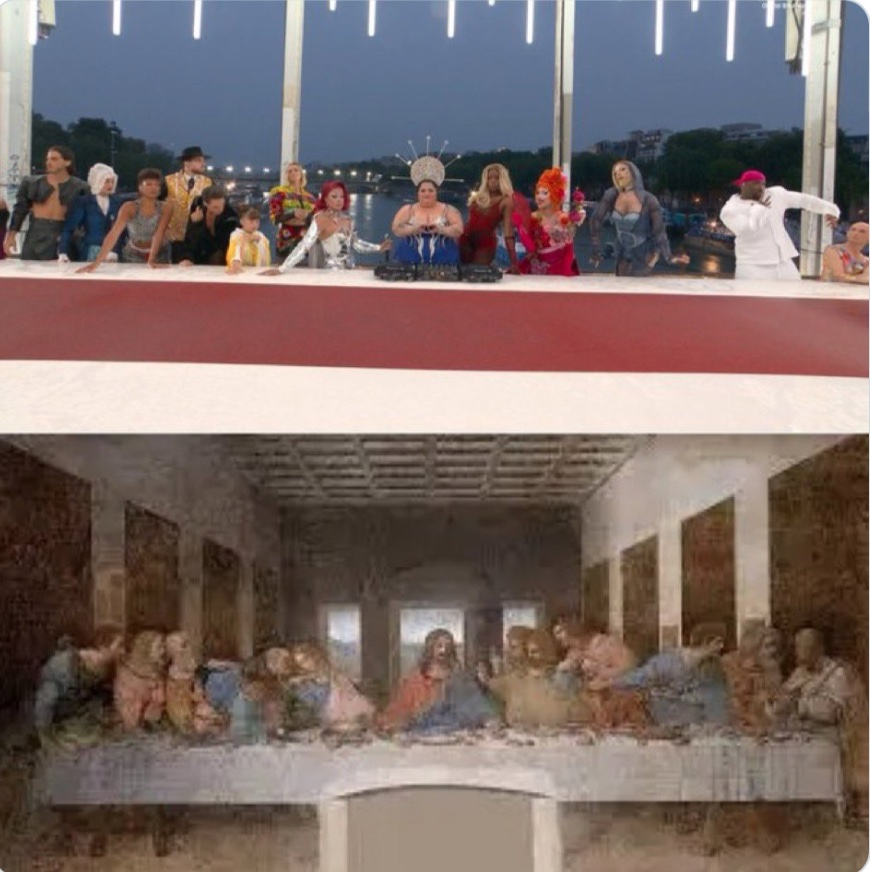The Paris Olympics opening ceremony, held on July 26, 2024, has stirred significant controversy due to a performance that parodied Leonardo da Vinci’s iconic painting, The Last Supper. This performance featured drag queens and has sparked outrage among various religious communities, particularly Christians. As the world tunes in to the Olympics, this incident raises important questions about artistic expression, respect for religious sentiments, and the boundaries of inclusivity.
What Happened During the Ceremony?

During the opening ceremony, a tableau titled “Festivity” was presented, which included drag queens and a transgender model reenacting the Last Supper scene. The performance aimed to highlight diversity and inclusion, showcasing LGBTQ+ references against the backdrop of the Seine River and the Eiffel Tower. Among the performers were notable figures from Drag Race France, including Nicky Doll and Paloma, who took center stage in this controversial act.
The Artistic Intent vs. Public Perception
The organizers intended to celebrate France’s vibrant culture and nightlife, but the video viral performance quickly faced backlash. Critics argue that while the intention might have been to promote inclusivity, the execution was seen as a blatant mockery of a sacred religious moment. This has led to a heated debate about the appropriateness of such representations in a global event like the Olympics.
Reactions to the Viral Video

Outrage from Religious Communities
The performance has drawn sharp criticism from Christian leaders and organizations. The French Catholic Church expressed its disapproval, stating that the ceremony included “scenes of derision and mockery of Christianity.” Prominent figures, including Bishop Robert Barron, labeled the parody as “blasphemous,” emphasizing the need for respect towards religious beliefs.
Support from LGBTQ+ Advocates
Conversely, supporters of the performance argue that it represents a bold step towards acceptance and visibility for the LGBTQ+ community. They contend that art should be free to challenge norms and provoke thought, even if it offends some. This dichotomy highlights the ongoing cultural clash between traditional values and modern expressions of identity.
The Leak Video and Its Impact
Social Media Explosion
As clips of the leak video circulated on social media, the outrage intensified. Viewers quickly shared their reactions, leading to a viral moment that amplified the controversy. The performance was discussed across platforms, with many calling for boycotts of the Olympics and condemning the organizers for what they perceived as a lack of sensitivity.
Political Backlash
The incident also caught the attention of politicians. Figures like Elon Musk and far-right politicians in France voiced their discontent, labeling the performance as an insult to Christians worldwide. This political dimension adds another layer to the discussion, intertwining art, religion, and societal values.
The Broader Debate on Artistic Expression
Navigating Sensitivity in Art
The Olympics Last Supper video controversy raises critical questions about the balance between artistic freedom and respect for religious sentiments. In a world where art often serves as a mirror to society, how do we navigate the fine line between provocation and offense? This incident serves as a reminder of the complexities involved in representing sacred symbols in modern art.
Cultural Sensitivity and Inclusivity
As societies become increasingly diverse, the challenge of creating inclusive spaces while respecting differing beliefs becomes paramount. The backlash against the Last Supper parody underscores the need for dialogue and understanding in artistic representations. How can artists and organizers ensure that their work is both inclusive and respectful?
The Lasting Implications of the Controversy
Impact on the Olympics’ Image
The fallout from this performance could have lasting effects on the Paris Olympics and its global image. As the games continue, the organizers must navigate the delicate balance of promoting inclusivity while addressing the concerns raised by critics. This incident could shape public perception of the Olympics for years to come.
Future of Artistic Expression in Public Events
The controversy surrounding the Last Supper parody may set a precedent for how artistic expression is approached in future public events. Will organizers become more cautious in their representations, or will they continue to push boundaries? This incident could influence the direction of artistic expression in major cultural events moving forward.
Conclusion: A Call for Dialogue
The Olympics Last Supper video controversy serves as a powerful reminder of the complexities of modern artistic expression. As we navigate a world filled with diverse beliefs and identities, it is crucial to foster dialogue that respects both artistic freedom and religious sentiments. The Paris Olympics has ignited a conversation that extends beyond the realm of sports, challenging us to consider how we engage with art, culture, and faith in an increasingly interconnected world.
